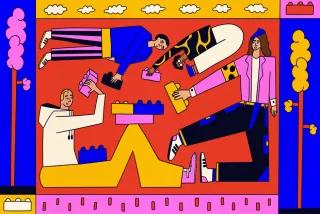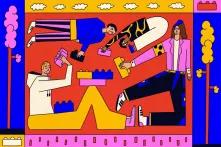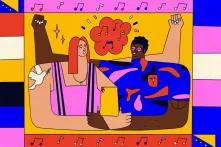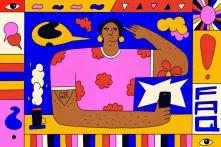Lou Herbst talks to Ed Greve, antidiscrimination-trainer and politician, about the opportunities and limitations of an anti-discriminatory identity politics, intersectionality and what ultimately leads to a divided society.

HBF: Hello Ed, nice of you to take the time for this interview. Today, we’re talking about identity politics – a term that’s consistently bandied about and played very strongly by different sides. How do you perceive the current debate?
Ed Greve: I think you should expect – should be able to expect – left-wing and social parties especially, or parties that consider themselves social, to have a particular interest in and see a particular necessity in protecting groups in society that are especially disadvantaged. I think it is, of course, also connected to how identity politics is negotiated in general. Many people have the impression that it’s not a matter of ‘important’ problems, but rather only ‘banal’ things, such as the gendered terms for addressing people. Although ‘banal’ is here understood to mean things that are supposedly not an immediate threat to life, such as losing your home. Language is thereby often negotiated as something that is considered separate from everything else. A lot of people don’t want to comprehend that language is connected to and perpetuates all other areas of society and social realities. Gender-neutral and gender-sensitive language, and the use of correct forms of address are by far, only a part of what trans people for instance, are calling for. If people can’t even show respect through language, they won’t do it through other things.
HBF: The impression is often given that the term ‘identity politics’ is perceived as negative. Can you explain why that is? What has led to this term or this concept often being misunderstood and ascribed negative connotations?
Ed Greve: I think that identity politics doesn’t only present marginalised groups with a social identity, based on experiences of exclusion and discrimination, but that we present ourselves with an identity. People with a disability, or disabilities, are excluded in the same way and thus have the same experiences. Identity politics leads to the otherwise invisible, supposedly neutral, privileged masses suddenly being ascribed an identity. This isn’t something they recognise, and they don’t want to recognise it either. It is most evident when white people resist being labelled as white, but in turn have no problem with, in some way or another, assigning origins and so on to every person they (un)consciously identify as a person of colour.
At the same time, Donald Trump for instance, also conducts identity politics. (White) America First, Make (white) America Great Again… The white is not voiced, but his actions show he is engaged in the identity politics of and for white people. This can also be transferred to many other areas of society, in which identity politics is by all means conducted – only as a matter of course, because it concerns ‘normal’ people. It is as if the norm has no identity, or only has the identity it wants to have. People have ‘dog lover’ or ‘German’ as an identity, or something they can relate to and want to relate to. And we have something we have to relate to.
HBF: To what extent does this ‘naming the norm’ provoke resistance? Could it be that identity politics is no longer being taken seriously as a result?
Ed Greve: Exactly. Intuitively, you would think: Okay, what’s the problem now? There’d be no problem if I were to say: I’m a chess player, you’re a football fan, and we were to describe each other as such. The problem arises when you make an identity that is otherwise often invisible visible, precisely because it exists in the context of an oppressive hierarchy. In making it visible you always make the balance of power visible too. I am only disabled because there are people who aren’t and because somewhere there is this boundary as to who can and can’t participate in society. Not every person who wears glasses is disabled. This is because there are no obstacles to participation – unless you don’t have the money to buy yourself a pair of glasses. But otherwise, you can participate in all areas of society. For that reason, it’s not a bad thing to say: I’m someone who wears glasses and you’re someone who doesn’t wear glasses. But the problem with the identities we talk about in the context of discrimination and politics is that they are identities that are associated with power.
HBF: You’ve spoken about discrimination often. Is anti-discrimination politics the same as identity politics for you?
Ed Greve: No, white people, or those who are fundamentalist Christians, or in general those who are in a position of power can also engage in identity politics. Anti-discrimination politics is not the same as identity politics. But what we generally mean by progressive identity politics, by the identity politics of marginalised groups, always entails anti-discrimination. There it’s really about saying: We as a group, with this social identity, with this oppressed identity, we’re campaigning for our rights. We’re campaigning against further discrimination.
HBF: I often hear the statement that identity politics is essentialist and risks dividing society. Does identity politics entail risks, does it have limits?
Ed Greve: Yes and no. Naturally, whenever campaigns are not conducted in an intersectional manner, there is a risk of people who are further oppressed within their own marginalised group being left behind. You see this in the example of white, gay, cis men who only secure rights for themselves and leave cis lesbians and other queer people behind. If identity politics is conducted as such that it is only about your own demands and only concerns you, it carries risk. These questions should therefore always be posed: Who else belongs to my oppressed group and how can I show solidarity on all levels?
I’d like to give an example in which a contradictory element of progressive identity politics is discernible:
My political strategy is to counter the prejudice that migrants don’t work. For instance, I do so by citing a lot of migrants all of whom work. I am thus creating a different image of migrants, but simultaneously betraying the people who in fact might not work because they aren’t permitted or aren’t able to. This means I’m in a state of tension all the time, where I have to ask: How do I deal with the fact that things sometimes contradict each other? This is a challenge of anti-discriminatory identity politics that we must keep on addressing.
HBF: In your opinion, what is the objective of an intersectional identity politics?
Ed Greve: We have to first become aware that power exists. Power, even if it has very negative connotations in German, is not a bad thing. Having power over others is problematic. But having power for yourself is a good thing: The power to shape your own life, the power and influence to help shape society. Some groups have this power, others are very far removed from it. If we proceed against discrimination from an intersectional angle, then we must take measures that enable everyone to participate in shaping society.
Care should be taken that everything we do is as accessible and available as possible for the people who have the least access to power. That is essentially the objective. We have to keep coming back to saying, if we’ve now fought for something, we have to look at who’s been left behind in the process and ask: What can we do to take you with us too?
HBF: What could this anti-discriminatory, intersectional identity politics look like in practice? Do you know of any concrete examples?
Ed Greve: Anti-discriminatory identity politics can, for instance, have an impact on schooling in that the following questions are asked: Whose stories are being told? Whose stories don’t feature? What images are being used? These questions need to be answered and material then revised. For anti-discriminatory legislation this means: We have to be consistently reviewing. In the German General Act on Equal Treatment (AGG - Allgemeines Gleichbehandlungsgesetz), and the Berlin State Anti-Discrimination Act (Berliner Landesantidiskriminierungsgesetz), we now have criteria that prohibit discrimination. We keep checking: Is this list of criteria sufficient? Do we really have all the identities, all the societal groups being oppressed represented in it or is that perhaps not true? It is indeed a problem that intersectionality isn’t considered in legislation. That has to improve.
HBF: What will it take to come away from the difficult dynamics of the culture of conflict surrounding identity politics?
Ed Greve: The initial problem is the following: Those who draw attention to grievances are unfortunately seen as divisive, not those who perpetuate these inequalities. Quite specifically, I would say: Sahra Wagenknecht and Wolfgang Thierse have split off a group, for whom they specifically want to conduct identity politics. These are people they deem the ‘normal’ population with ‘normal’ problems. However, structural exclusion is at work here. And here it indeed comes down to those involved and witness to these arguments and debates to say: Wait! We don’t want you to leave. We want to think from the periphery inward. We want to think as inclusively as possible. We want to set out our demands in such a way that they work for everyone. These people have to make noise and say: We’re standing against such attempts at division like those of Sahra Wagenknecht and Wolfgang Thierse.
HBF: What advice would you give a foundation like the Heinrich Böll Foundation? Do you think it’s important that a foundation affiliated with The Greens gets involved with what we’re doing here?
Ed Greve: You must be aware you have influence! A foundation affiliated with The Greens is taken quite seriously in party circles and beyond. It is then this foundation’s job to get involved. I have to show solidarity with those on the furthest margins. I have to say: The way you’re discussing this right now is not okay. We see it like this… And we support the demands of people on the margins. We support them verbally and materially, and with all the influence we have at our disposal.
HBF: Thinking about the next twenty years: In what way does anti-discrimination politics or the debate around identity politics need to change further? What would your utopia be?
Ed Greve: I’m not a very utopian-thinking person, I’m rather pessimistic (laughs). But I just think we won’t make progress if we don’t talk about differences in power. It’s important that people recognise precisely this aspect. Of course, intuitively I can understand why talking about power isn’t easy. Emotionally, I can empathise with it. It is harrowing to discover, even if I don’t buy into it myself, that I’m nevertheless part of a system. It’s no longer enough to say: I want to be one of the good ones, or I am one of the good ones, because I want this and this. Rather it shows I have inherited certain social positioning.
I may well be able to empty my bank account and give someone else my money. But there are also things you can’t concede. You can’t completely concede how people see you. If you’re a cis man, you can never concede that people will always think of you as a little more intellectual or experienced, more educated, more intelligent than the cis woman standing next to you. But it’s not about conceding something yourself as an individual, rather very much about convincing your environment. Because if one person changes their attitude and behaviour, it has repercussions. But the way our society is currently built, we need majority solidarity for social change.
HBF: Thank you so much!


